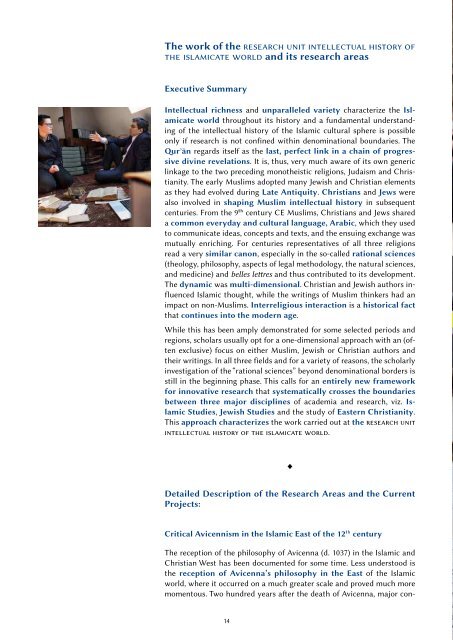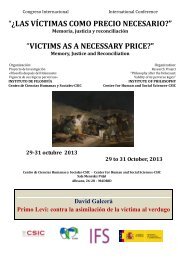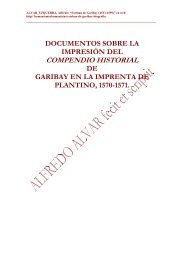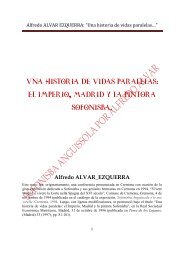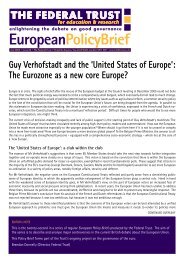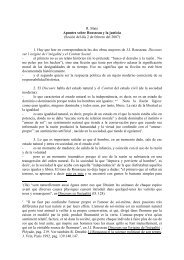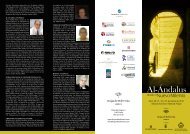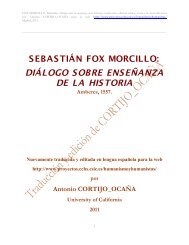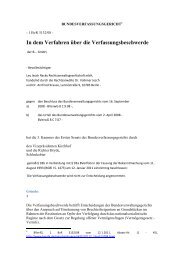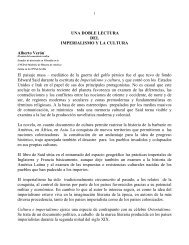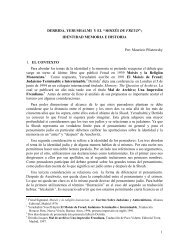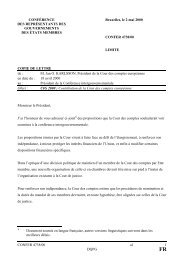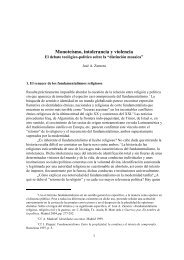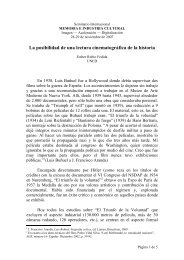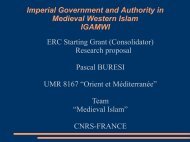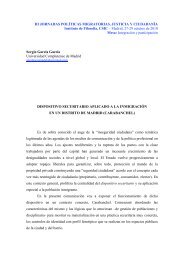brochure 2012 - Consejo Superior de Investigaciones CientÃficas
brochure 2012 - Consejo Superior de Investigaciones CientÃficas
brochure 2012 - Consejo Superior de Investigaciones CientÃficas
You also want an ePaper? Increase the reach of your titles
YUMPU automatically turns print PDFs into web optimized ePapers that Google loves.
The work of the Research Unit Intellectual History of<br />
the Islamicate World and its research areas<br />
Executive Summary<br />
Intellectual richness and unparalleled variety characterize the Islamicate<br />
world throughout its history and a fundamental un<strong>de</strong>rstanding<br />
of the intellectual history of the Islamic cultural sphere is possible<br />
only if research is not confined within <strong>de</strong>nominational boundaries. The<br />
Qurʾān regards itself as the last, perfect link in a chain of progressive<br />
divine revelations. It is, thus, very much aware of its own generic<br />
linkage to the two preceding monotheistic religions, Judaism and Christianity.<br />
The early Muslims adopted many Jewish and Christian elements<br />
as they had evolved during Late Antiquity. Christians and Jews were<br />
also involved in shaping Muslim intellectual history in subsequent<br />
centuries. From the 9th century CE Muslims, Christians and Jews shared<br />
a common everyday and cultural language, Arabic, which they used<br />
to communicate i<strong>de</strong>as, concepts and texts, and the ensuing exchange was<br />
mutually enriching. For centuries representatives of all three religions<br />
read a very similar canon, especially in the so-called rational sciences<br />
(theology, philosophy, aspects of legal methodology, the natural sciences,<br />
and medicine) and belles lettres and thus contributed to its <strong>de</strong>velopment.<br />
The dynamic was multi-dimensional. Christian and Jewish authors influenced<br />
Islamic thought, while the writings of Muslim thinkers had an<br />
impact on non-Muslims. Interreligious interaction is a historical fact<br />
that continues into the mo<strong>de</strong>rn age.<br />
While this has been amply <strong>de</strong>monstrated for some selected periods and<br />
regions, scholars usually opt for a one-dimensional approach with an (often<br />
exclusive) focus on either Muslim, Jewish or Christian authors and<br />
their writings. In all three fields and for a variety of reasons, the scholarly<br />
investigation of the “rational sciences” beyond <strong>de</strong>nominational bor<strong>de</strong>rs is<br />
still in the beginning phase. This calls for an entirely new framework<br />
for innovative research that systematically crosses the boundaries<br />
between three major disciplines of aca<strong>de</strong>mia and research, viz. Islamic<br />
Studies, Jewish Studies and the study of Eastern Christianity.<br />
This approach characterizes the work carried out at the Research Unit<br />
Intellectual History of the Islamicate World.<br />
♦<br />
Detailed Description of the Research Areas and the Current<br />
Projects:<br />
Critical Avicennism in the Islamic East of the 12th century<br />
The reception of the philosophy of Avicenna (d. 1037) in the Islamic and<br />
Christian West has been documented for some time. Less un<strong>de</strong>rstood is<br />
the reception of Avicenna’s philosophy in the East of the Islamic<br />
world, where it occurred on a much greater scale and proved much more<br />
momentous. Two hundred years after the <strong>de</strong>ath of Avicenna, major con-<br />
14


